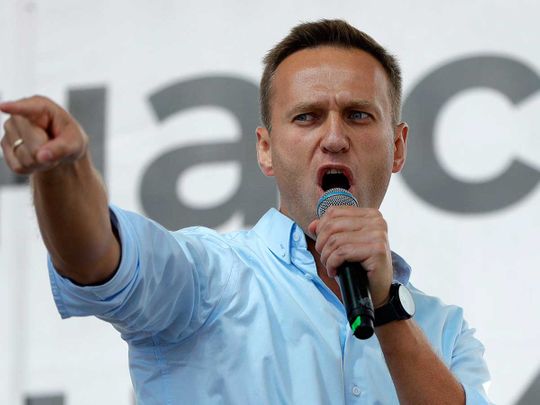
Berlin: The German government said tests performed on samples taken from Russian opposition leader Alexei Navalny showed the presence of the Soviet-era nerve agent Novichok.
German Chancellor Angela Merkel on Wednesday demanded answers from Russia over the alleged poisoning. ""This has given rise to some very serious questions that only Russia can and must answer," Merkel said.
The Kremlin responded to her call, saying that Russia was ready to cooperate fully with Germany over the case of opposition leader Alexei Navalny after Berlin confirmed he was poisoned with a nerve agent.
Kremlin spokesman Dmitry Peskov told journalists: "In general we confirm that we are ready and have an interest in full cooperation and exchange of data on this topic with Germany," quoted by RIA Novosti state news agency.
Who is Navalny?
Navalny, a politician and corruption investigator who is one of Russian President Vladimir Putin’s fiercest critics, fell ill on a flight back to Moscow from Siberia on Aug 20 and was taken to a hospital in the Siberian city of Omsk after the plane made an emergency landing.
He was later transferred to Berlin’s Charite hospital, where doctors last week said there were indications that he had been poisoned.
Chancellor Angela Merkel’s spokesman, Steffen Seibert, said in a statement Wednesday that testing by a special German military laboratory had shown proof of “a chemical nerve agent from the Novichok group.”
Novichok, a Soviet-era nerve agent, was used to poison former Russian spy Sergei Skripal and his daughter in Britain. It is a cholinesterase inhibitor, part of the class of substances that doctors at the Charite initially identied in Navalny.
Seibert said the German government will inform its partners in the European Union and NATO about the test results. He said that it will consult with its partenrs in light of the Russian response “on an appropriate joint response.”
Navalny’s allies in Russia have insisted he was deliberately poisoned by the country’s authorities, accusations that the Kremlin rejected as “empty noise.”
The Russian doctors who treated Navalny in Siberia have repeatedly contested the German hospital’s conclusion, saying they had ruled out poisoning as a diagnosis and that their tests for poisonous substances came back negative.
What is Novichok?
Novichok, the nerve agent that Germany says was used to poison Alexei Navalny, a critic of Russian President Vladimir Putin who is in a coma in a Berlin hospital, was developed in the Soviet Union in the 1970s and 1980s.
The name Novichok means "newcomer". It is used for a family of highly toxic nerve agents with a composition slightly different from the better known poison gases VX and sarin.
Novichok agents are believed to be five to 10 times more lethal than those substances, although there are no known uses before 2018, when Novichok was deployed in Britain on a former Russian spy and his daughter.
Moscow is not believed ever to have declared Novichok or its ingredients to the Hague-based Organisation for the Prohibition of Chemical Weapons (OPCW), which oversees a treaty banning their use.
The weaponisation of any chemical is banned under the 1997 Chemical Weapons Convention, of which Moscow is a signatory.
In November 2019, members of the OPCW agreed to expand its list of banned "Schedule 1" chemicals to include Novichok agents. That ban went into effect on June 7, 2020.
Made with agrochemicals
Novichok was made with agrochemicals so that its production could more readily be hidden within a legitimate commercial industry, according to U.S. chemical weapons expert Amy Smithson.
Russia and the United States once ran two of the largest chemical weapons programs in the world. Russia completed the destruction of a stockpile declared to the OPCW last year. The United States is in the final stages of destroying its own stockpile.
However, publications about development and testing of Novichok in the 1990s raised U.S. suspicions that the Soviet Union had a secret weapons program, and did not declare its full stockpile when it joined the OPCW.
Russia was once believed to possess thousands of tonnes of weaponised Novichok varieties and their precursors, according to a 2014 report by the U.S.-based Nuclear Threat Initiative, a non-partisan group working to reduce the threat of weapons of mass destruction.
Causes slowing of the heart
The chemical "causes a slowing of the heart and restriction of the airways, leading to death by asphyxiation", according to Professor Gary Stephens, a pharmacology expert at the University of Reading. "One of the main reasons these agents are developed is because their component parts are not on the banned list."
Britain says Russia used Novichok to poison former spy Sergei Skripal and his daughter Yulia in the British city of Salisbury two years ago. Russia has repeatedly denied any involvement in the attack, which the Skripals survived. One member of the public, Dawn Sturgess, was killed. Decontamination and recovery measures in the city cost millions of pounds.








